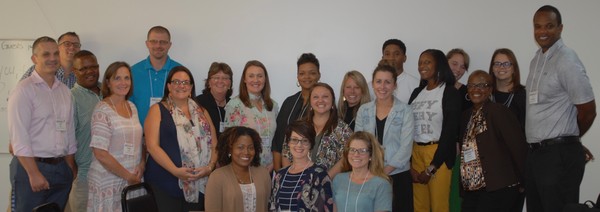Fellows provide support to their cohort, take one another’s ideas back to their schools, write columns about their experiences, and speak locally and nationally about their Opportunity Culture roles. Their feedback and leadership are invaluable in helping to improve the Opportunity Culture initiative, and all materials related to it.
This year’s fellows come from Arizona, Illinois, and four North Carolina school districts. We welcome and congratulate:
Multi-Classroom Leaders:
- James Cerasani, Randolph Elementary, Chicago Public Schools, Illinois
- Casandra Cherry, Phillips Middle, Edgecombe County Public Schools, North Carolina
- Cherie Dixon, LB Yancey Elementary, Vance County Schools, North Carolina
- Frederick Hoffman, Ferndale Middle, Guilford County Schools, North Carolina
- Casey Jackson, Aycock Elementary, Vance County Schools, North Carolina
- Steven Kennedy, Wilson Middle School, Charlotte-Mecklenburg Schools, North Carolina
- Amy Pearce, North Edgecombe High, Edgecombe County Public Schools, North Carolina
- Angela Porter, Hairston Middle, Guilford County Schools, North Carolina
- Christina Ross, Desert Oasis Elementary, Nadaburg Unified School District No. 81, Arizona
- Keisha Wheat, Randolph Elementary, Chicago Public Schools, Illinois
- Kristen Boyd, Aycock Elementary, Vance County Schools, North Carolina
- Elizabeth Meyers, Randolph Elementary, Chicago Public Schools, Illinois
- Jenny O’Meara, Phillips Middle, Edgecombe County Public Schools, North Carolina
- Merrie Conaway, Foust Elementary, Guilford County Schools, North Carolina
- Eric Ward, Harding University High School, Charlotte-Mecklenburg Schools, North Carolina

As this cohort begins the fellowship over the summer, the 2018–19 cohort will be wrapping up their year, culminating in a convening for all past and current fellows in September. We thank all fellows for their participation, Opportunity Culture advocacy, and feedback to improve the initiative.“Every year, fellows lead in their classrooms and schools; the fellowship gives them an opportunity to lead and advocate for a stronger profession at a national level,” said Sharon Kebschull Barrett, vice president for editorial services and communications at Public Impact, who oversees the fellowship and works closely with fellows to learn from their experiences through interviews and column writing. “They lead us as well, pointing the way for Public Impact to continually improve Opportunity Culture for other educators.”
The national Opportunity Culture initiative, founded by Public Impact and now in 28 sites in nine states, extends the reach of excellent teachers and their teams to more students, for more pay, within schools’ recurring budgets.
